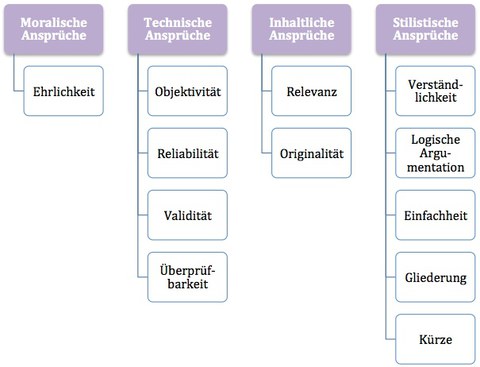Gütekriterien wissenschaftlicher Arbeiten
Motivation
- Jeder, der einen Abschluss an einer Hochschule erlangen möchte, ist gesetzlich verpflichtet, eine dem Grad entsprechende wissenschaftliche Arbeit zu verfassen
- Auseinandersetzung mit aktuellem Stand der Wissenschaft; eigenverantwortliche Themenbearbeitung
- Problembereich erfassen, sinnvolle Bearbeitung innerhalb einer gewissen Zeitspanne, Forschungsfrage hinreichend detailliert beantworten
- Zur Veröffentlichung von Forschungsergebnissen
- Reputation eines Forschenden
- Diskussionsgrundlagen
Abgrenzung
| Wissenschaftliche Arbeit | Belletristisches Werk |
|---|---|
| Sachlicher, objektiver Stil | Flüssiger, meist subjektiver Stil |
| Erkenntnisgewinn steht im Vordergrund | Unterhaltungswert steht im Vordergrund |
| Nachvollziehbares Arbeiten | Leser weiß nicht, wie der Autor zum Inhalt kommt |
| Überindividuelle Relevanz der Ergebnisse | Interesse am Inhalt steht im Vordergrund, nicht die Pragmatik |
| Behandelt reale Phänomene | Behandelt Fiktives oder Reales |
| Inhalt und Argumente sind literaturgestützt | Meist werden keine Literaturquellen angegeben |
| Systematisches Bearbeiten der Themenstellung | Aufbereitung des Inhaltes liegt im Ermessen des Autors |
Ansprüche an wissenschaftliche Arbeiten
Ehrlichkeit
- Moralische Ansprüche können durch vorsätzliches Falschverhalten verletzt werden (z.B. Manipulation der Forschungsergebnisse, Plagiat)
Objektivität
- Kann durch Vorlieben, Vorurteilen, Ressentiments, übergroßer Ehrgeiz, Hoffnungen und Erwartungen sowie einen eingeschränkten Blickwinkel entstehen
- Für Objektivität sorgen durch:
- Sachliche Darstellung
- Korrekte Quellenangaben
- Repräsentative Auswahl
- Klare Beschreibung
- Ehrliche Darstellung
- Korrekte Interpretation
- Berücksichtigung von Einwänden
- Objektivität beschreibt den Grad der Unabhängigkeit:
- Vom Ersteller einer wissenschaftlichen Arbeit
- Vom Auswerter und Gutachter
Reliabilität
- Messinstrumente messen höchst zuverlässig mit stabilen Ergebnissen
- Passgenaue Instrumente aussuchen
- Instrumente müssen funktionieren und exakt messen
- Sorgfältige Auswahl angemessener Methoden
Validität
- Wird gemessen, was gemessen werden soll?
- Fehlerquellen:
- Suchfragen, die zu große Antwortspielräume haben
- Zu kleine Stichprobe oder falsche Stichprobenwahl
- Inhaltsgültige Ergebnisse erzielen:
- Die richtigen Inhaltsbereiche bearbeiten
- Fragen passgenau formulieren
- Um Irritationen zu vermeiden, wichtige Begriffe definieren
- Stichprobe muss repräsentativ und groß genug sein
Überprüfbarkeit
- Überprüfbarkeit von Aussagen:
- Nachbildung von Experimenten und Lösungswegen
- Betrachtung der Herkunft des verwendeten Materials
- Feststellung des Wahrheits- und Informationsgehaltes von Aussagen
- Kontrolle von logischen Schlussfolgerungen
- Kontrolle von Quellen
- Kontrolle von Zwischen- und Endergebnissen
- Wissenschaftlich vs. Unwissenschaftlich
- Was nicht überprüfbar ist, gilt als nicht wissenschaftlich
- Widerlegbarkeit von Aussagen:
- Um Irritationen zu vermeiden, wichtige Begriffe definieren
- Methode der Falsifikation
Relevanz
- Für wissenschaftliches Arbeiten ist relevant:
- Was zum wissenschaftlichen Fortschritt beiträgt
- Was im eigenen Fachgebiet neues Wissen schafft
- Was hilft, Praxisprobleme zu lösen
- Relevant ist, was einen hohen Informationswert hat
Originalität
- Quantität versus Qualität:
- Intensiv mit dem Wissens- und Erfahrungsschatz des Fachgebietes auseinandersetzen
- Zeitgemäßes Know-how erwerben
- Das Erfahrene mit den persönlichen Zielen verbinden
- Eigene, originelle Lösungsvorschläge entwickeln
- Wissen verknüpfen
- Folgen abschätzen – kritisch bleiben
Verständlichkeit
- Gute Schriftgestaltung und ein ansprechendes Layout
- Folgerichtige inhaltliche Struktur:
- Thema abgrenzen, Problemzusammenhang und Ziel aufzeigen
- Vorgehen, Methodeneinsatz und Endergebnis dokumentieren
- Wesentliche Ergebnisse zusammenfassen, Nutzen der Ergebnisse und Ausblick aufzeigen
- Zweckmäßige, sprachliche Aufbereitung der Texte
- Rechtschreibung und Grammatik beachten
- Nicht bekannte wichtige Begriffe definieren
- Präzise formulieren
- Logische Argumentation
- Einfachheit (Gegenteil: Kompliziertheit)
- Kürze / Prägnanz (Gegenteil: Weitschweifigkeit)

